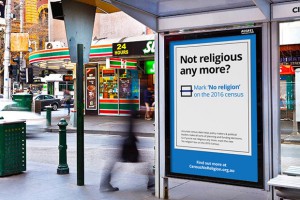Consensus on the Census: Will Australia Officially Turn Secular?
An exciting push for secularism is happening down under, where the Atheist Foundation of Australia is pushing to make “no religion” the largest religious identification for the August 9 national census. On the last census in 2011, 22 percent (4.7 million) marked no religion for their religious preference, falling just below top-choice Catholicism at 25 percent (5.4 million). To ensure that “no religion” tops the list this time around, the Atheist Foundation of Australia has launched a campaign to unify secularists into checking this choice on the census section on religious identification. “Were you born into a religion but are no longer religious?” the campaign asks in presenting the case for Australian citizens to choose the nonreligious option.
Over the past fifty-five years Australians have made great strides in secular identification, rising from less than 1 percent of the population in 1961 to 22 percent in the last census. The numbers could be even higher, the campaign notes, if people who write in “Jedi” or “Pastafarian” would mark “no religion” instead. Jedi received 0.37 percent (65,000) support in the 2011 Australian census. It may seem like a drop in the bucket, but given that the margin between “no religion” and “Catholicism” was only three percent, every little bit counts. Even if those writing in “Jedi” or “Pastafarian” are totally sincere, the campaign notes that such answers are chucked into the “not defined” category. Those who wish to identify as “humanist,” “atheist,” “rationalist,” or “agnostic” may write in these choices, all of which will be funneled into the category of “no religion” for the survey statistics.
In the past, the rhetorical phrasing of the religious section has created inaccurate representations of the secular population (simply those who no longer practice any religion) in Australia. The phrasing could be responsible for over half of Australians leaving this section blank. To the skimming eye, it would appear that this section is only for those who identify as religious. Another possible confusion is the placement of the “no religion” option, which has been at the bottom of all the categories, even below “other.”
Even though it’s an optional category, the religion section of the census matters because it influences the government’s allocation of funds to religious and non-religious institutions. “Census data is used by governments to make important funding decisions,” notes Kylie Sturgess, the current president of the Atheist Foundation of Australia. “Like assigning chaplains to hospitals, schools, prisons, and armed services, for planning educational facilities, for aged care, and other social services.” This is precisely why the Atheist Foundation of Australia is urging citizens to mark “no religion” on their census forms.
If you live in the United States and would like to help the cause, consider supporting the Atheist Foundation of Australia’s campaign via a donation to their IndieGoGo page, where they are close to meeting their goal.

